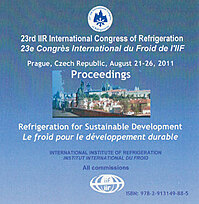
Document IIF
Quest II : réduction des émissions de CO2 des conteneurs frigorifiques maritimes.
Quest II: reduction of CO2 emissions of reefer containers.
Numéro : pap. ID: 459
Auteurs : LUKASSE L. J. S., BAERENTZ M. B., KRAMER-CUPPEN J. E. de
Résumé
This paper reports on the QuestTM II (quality and energy in storage and transport) development project run by Wageningen UR Food & Biobased Research, Maersk Line and Carrier Transicold. The aim of the Quest II development project was to improve the control of refrigerated marine container (reefer) units with the objective of maximizing energy efficiency in chilled mode operation without impairing produce quality. Lab testing research on produce quality revealed thelimits by which deviations from the optimal transport temperatures are acceptable. Those limits were used in the design of the Quest II algorithm. Quest II control reduces energy consumption in chilled mode operation by 65% compared to non-Quest control. The savings are achieved by replacing continuous throttled compressor operation by an ON/OFF compressor control, and by automaticallyoptimizing internal air circulation with heat load instead of continuous operation at maximum internal air circulation. Extensive produce quality research and hundreds of field trials reveal no adverse effect on produce quality while using the Quest II algorithm.
Documents disponibles
Format PDF
Pages : 9 p.
Disponible
Prix public
20 €
Prix membre*
Gratuit
* meilleur tarif applicable selon le type d'adhésion (voir le détail des avantages des adhésions individuelles et collectives)
Détails
- Titre original : Quest II: reduction of CO2 emissions of reefer containers.
- Identifiant de la fiche : 30003072
- Langues : Anglais
- Source : Proceedings of the 23rd IIR International Congress of Refrigeration: Prague, Czech Republic, August 21-26, 2011. Overarching theme: Refrigeration for Sustainable Development.
- Date d'édition : 21/08/2011
Liens
Voir d'autres communications du même compte rendu (569)
Voir le compte rendu de la conférence
Indexation
-
Study on the capacity control of a newly-develo...
- Auteurs : CHEN W., HUA K., YANG M., et al.
- Date : 16/08/2015
- Langues : Anglais
- Source : Proceedings of the 24th IIR International Congress of Refrigeration: Yokohama, Japan, August 16-22, 2015.
- Formats : PDF
Voir la fiche
-
Temperature distribution in marine refrigerated...
- Auteurs : LAWTON A. R., MYNOTT T. O., MARSHALL N.
- Date : 21/08/2011
- Langues : Anglais
- Source : Proceedings of the 23rd IIR International Congress of Refrigeration: Prague, Czech Republic, August 21-26, 2011. Overarching theme: Refrigeration for Sustainable Development.
- Formats : PDF
Voir la fiche
-
Energy consumption reduction in marine refriger...
- Auteurs : LAWTON A. R., MYNOTT T. O., MARSHALL N.
- Date : 29/03/2010
- Langues : Anglais
- Source : 1st IIR International Conference on Sustainability and the Cold Chain
- Formats : PDF
Voir la fiche
-
Analysis of methods to improve the energy effic...
- Auteurs : KHMELNIUK M., TRANDAFILOV V. V., YAKOVLEVA O., YALAMA V.
- Date : 09/2024
- Langues : Anglais
- Source : 11th IIR Conference on Compressors and Refrigerants.
- Formats : PDF
Voir la fiche
-
New technologies allow radical energy savings i...
- Auteurs : CROMBIE D.
- Date : 19/09/1999
- Langues : Anglais
- Source : 20th International Congress of Refrigeration: Refrigeration into the Third Millennium.
- Formats : PDF
Voir la fiche
